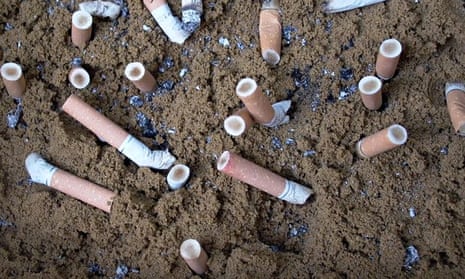A torn up love letter, a wedding dress and a loaded handgun. These are just some of the items discovered during the Ocean Conservancy’s International Coastal Cleanup initiative (ICC). But these intriguing finds aside, year after year cigarette butts are the most commonly found form of ocean litter.
In 2014, ICC volunteers collected some 2m cigarette butts – a huge amount, but just the tip of the iceberg. Approximately 4.5tn of the 6tn cigarettes consumed annually are littered across the globe.
The majority of cigarette waste that ICC collects from beaches is the result of improper disposal. “Many people, even smokers, are not aware that the cigarette filter is comprised of thousands of little particles of plastic,” says Nicolas Mallos, director of Trash Free Seas Program at the Ocean Conservancy in Washington DC. “One solid filter ends up being thousands of tiny fibres that can be released into the marine environment.”
While we know cigarettes damage our bodies, we still don’t fully understand their health implications for our oceans, beyond that other forms of microplastics and microfibres pose a risk to marine organisms. A study from San Diego State University suggests one smoked cigarette butt in a single litre of water is sufficient to kill both marine and freshwater fish, although how this translates from the laboratory to an actual aquatic setting isn’t yet clear.
The vast majority of cigarette butts collected by ICC volunteers are currently sent to landfill due to a lack of recycling infrastructure. US company Terracycle is aiming to divert this waste and convert it into new products. Its Cigarette Waste Brigade programme, which was launched in Canada in 2012 and encourages smokers to recycle their butts, has since expanded into the US, Australia and Japan. A pilot programme is planned to launch in the UK before the end of the year.
Albe Zakes, Terracycle’s global vice president of communication, says: “The cigarette filter is made from cellulose acetate, which is actually the largest component of most sunglasses, so that material can really get recycled just like regular plastic.”
Because of the stigma around cigarette butts and fear of carcinogens, Terracycle doesn’t use its recycled cigarette butt plastic for consumer products, but Zakes says the end result is 100% free of carcinogens, bio-toxins and nicotine. “It’s just as clean and safe as a recycled plastic bottle would be,” he says.
But if it’s possible to turn such a globally widespread waste stream into commercially viable products, then why aren’t more doing so?
Getting people to collect cigarette butts is one challenge, but the main hurdle is cost. “From a material standpoint, everything can be recycled, [but] if it costs more to collect and process than the material is worth in the open market, then it’s considered non-recyclable and no private companies will do it”, Zakes says.
Terracycle is able to recycle many of its materials cost effectively thanks to funding from major companies. For cigarette waste, it partners with Santa Fe Natural Tobacco Company in the US, Imperial Tobacco in Canada and multiple tobacco companies in Australia. These firms sponsor the collection costs, so Terracycle is left only with the processing costs.
For its part, since 1994 the ICC has partnered with tobacco company Altria. It also has partnerships with many global companies, such as Coca-Cola and the Bank of America in order to achieve an engaged global reach.
Partnering with tobacco companies for clean up solutions is nevertheless controversial. Thomas Novotny, professor in epidemiology and biostatistics at the San Diego State University, is concerned that it could be proving a barrier to finding upstream solutions that prevent the problem in the first place.
Several US states have passed paint stewardship laws, which see unused paint taken back by outlets and recycled or redistributed, and Novotny thinks this model of extended producer responsibility could be applied to the tobacco industry.
Ultimately Novotny, who co-authored the paper which found cigarette waste is capable of killing fish, wants to get rid of the filter completely. “The filter is a huge marketing tool; it is not a health device,” he says. “If you ask any smoker what they would do if you took away their filter, many of them would say they would quit”.
Currently, a legislator in California is seeking to make it illegal to sell or give away filtered cigarettes. It is estimated that it costs the state $41m each year to clean up tobacco butts.
Perhaps tobacco companies and the chemical companies, that make filters, can meet environmentalists somewhere in the middle. “One area that requires research and continued efforts is thinking about how you can redesign a cigarette filter, so that if it is littered or escapes into the marine environment, then its impact is zero,” says Mallos.
To date, biodegradable filters have had limited success due to performance issues, but there are signs of progress. Although admitting it still had “technical hurdles to overcome”, natural filter company Greenbutts announced it had signed an agreement with an undisclosed multinational tobacco company in November last year.
For Novotny though, biodegradable butts aren’t the answer, because they would still leach out toxins. He claims cigarette butts are the last acceptable form of littering and banning the filter would reduce the amount of cigarettes smoked by a long shot. Even e-cigarettes which are often disposal and powered by batteries aren’t environmentally pain free. “If nobody smokes, there wouldn’t be this problem.”

Comments (…)
Sign in or create your Guardian account to join the discussion